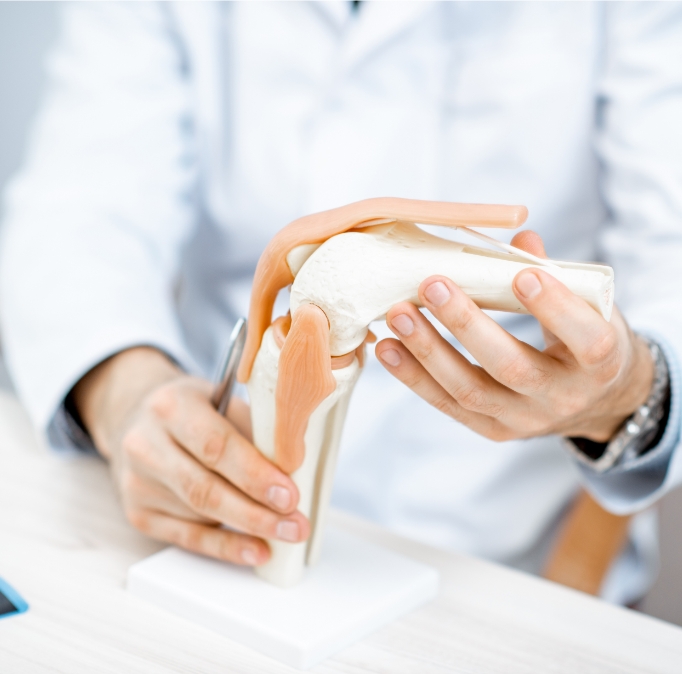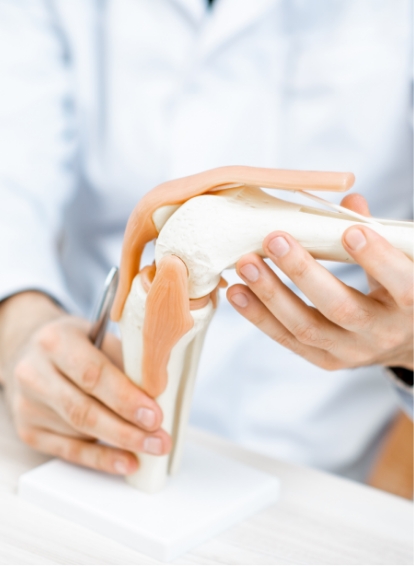Sports & Non-Surgical Orthopaedic Treatments
Chronic Muscle Pain
Chronic muscle pain, also known as myofascial pain syndrome, is a persistent discomfort affecting the muscles and surrounding tissues. Unlike typical muscle soreness that resolves within days, chronic muscle pain can last for weeks or months, impacting quality of life and limiting daily activities. This condition often involves trigger points—sensitive areas in the muscle that produce pain in nearby areas.
At The Clinica, our Sports & Non-Surgical Orthopaedics team provides comprehensive assessment and treatment for chronic muscle pain, helping patients find relief, restore muscle function, and prevent further complications.

What is it?
Chronic muscle pain is characterised by persistent, aching discomfort in one or more muscle groups. This pain can be localised to a specific area, such as the neck or lower back, or it may be widespread, affecting various parts of the body. Unlike acute pain, which serves as the body’s warning system for injury, chronic muscle pain often continues beyond the healing period, becoming a source of ongoing discomfort and fatigue.
One of the primary features of chronic muscle pain is the presence of trigger points—tight knots within the muscle fibres that cause pain and sensitivity when pressed. These trigger points may radiate pain to surrounding areas, making it difficult to pinpoint the exact origin of the pain. Activities involving repetitive motions, poor posture, or prolonged muscle tension can all contribute to the development of trigger points and chronic muscle pain.
The pain can vary from dull aching to sharp discomfort, often accompanied by muscle stiffness, limited range of motion, and fatigue. Chronic muscle pain can affect sleep quality and mental well-being, further complicating daily life. Managing this condition requires a holistic approach that addresses the root causes, lifestyle factors, and tailored treatment options.
Book an appointment
Additional Information

Causes of the condition
Chronic muscle pain can result from multiple factors, including physical, emotional, and lifestyle-related elements. Repetitive strain from activities such as prolonged computer use or heavy lifting can overload specific muscle groups, causing microtrauma and inflammation that leads to chronic pain. Poor posture or improper ergonomics can also strain muscles, creating tension and discomfort over time.
Stress and emotional factors can exacerbate chronic muscle pain, as tension tends to accumulate in certain muscle areas like the shoulders, neck, and back. Conditions such as fibromyalgia and myofascial pain syndrome, which are associated with widespread pain and fatigue, can contribute to chronic muscle pain.
Muscle imbalances, lack of physical activity, and even sleep disturbances can also play a role. Identifying the root causes and addressing contributing lifestyle factors is essential for effective treatment and long-term relief.
Tests that can be done to confirm the condition
Diagnosing chronic muscle pain typically begins with a physical examination and a thorough review of symptoms, lifestyle habits, and medical history. The clinician may assess the affected muscle groups, looking for trigger points, tenderness, and areas of muscle stiffness. Specific tests may be performed to assess muscle strength, flexibility, and range of motion.
Imaging tests such as MRI and ultrasound may be used in some cases to rule out structural issues or underlying conditions that could contribute to muscle pain. These tests are useful for identifying muscle inflammation or potential injury. While imaging may not always detect trigger points, they help eliminate other causes, such as joint or nerve issues.
In cases where chronic muscle pain is suspected to be part of a broader condition like fibromyalgia, additional tests or consultations with a specialist may be necessary. Blood tests may be recommended to exclude other conditions, such as thyroid disorders or infections, which could mimic muscle pain.
Effective treatments
Treating chronic muscle pain requires a multifaceted approach tailored to each patient’s specific needs and contributing factors. Initial treatment may include rest, stretching, and physical therapy to improve muscle flexibility, relieve tension, and restore function. Physical therapy focuses on exercises that strengthen and stabilise the affected muscles, while gentle stretching helps reduce stiffness and pain.
Trigger point therapy is particularly effective for chronic muscle pain. Techniques such as massage, dry needling, and myofascial release target trigger points to reduce muscle tightness and relieve pain. These therapies work by relaxing the knots within the muscles, promoting blood flow, and accelerating recovery.
Non-surgical treatments, such as ultrasound therapy and low-level laser therapy, may also be beneficial. These modalities use sound waves or light energy to reduce inflammation, stimulate healing, and provide pain relief. In cases of severe or persistent pain, medications like muscle relaxants, anti-inflammatory drugs, or pain relievers may be prescribed as part of a comprehensive treatment plan.
Book an appointment for the initial consultation
Booking an initial consultation at The Clinica is the first step towards managing chronic muscle pain effectively. During this appointment, our specialist will conduct a comprehensive assessment, discussing your symptoms, lifestyle factors, and any contributing activities. A physical examination of the affected muscles will help identify trigger points and areas of tension.
If necessary, additional tests will be arranged to rule out other causes and confirm the diagnosis. Following this assessment, a personalised treatment plan will be developed, focusing on pain relief, rehabilitation, and strategies to manage chronic muscle pain effectively and prevent recurrence.
Frequently Asked questions
While chronic muscle pain may not always be “cured,” it can be managed effectively with appropriate treatment and lifestyle changes to reduce symptoms and improve quality of life.
Trigger points are a common cause, but other factors, such as poor posture, repetitive strain, and stress, can also contribute to chronic muscle pain. A comprehensive assessment helps identify all contributing factors.
Improvement varies depending on the treatment plan and individual factors. Many patients experience relief within a few weeks, while more severe cases may require longer-term management.
Yes, physical therapy is highly effective in managing chronic muscle pain, focusing on exercises that strengthen, stretch, and relieve tension in affected muscle groups.
Medication may be recommended for pain relief, particularly if other treatments are insufficient. Your specialist will determine the need for medication based on your symptoms and overall treatment plan.
Specialised Clinics
General Enquiries
Please send your enquiry to us and our Practice Manager will be in touch shortly. Alternatively, if you would rather speak to us or your enquiry requires our urgent attention, please call us on 01344 946363.








